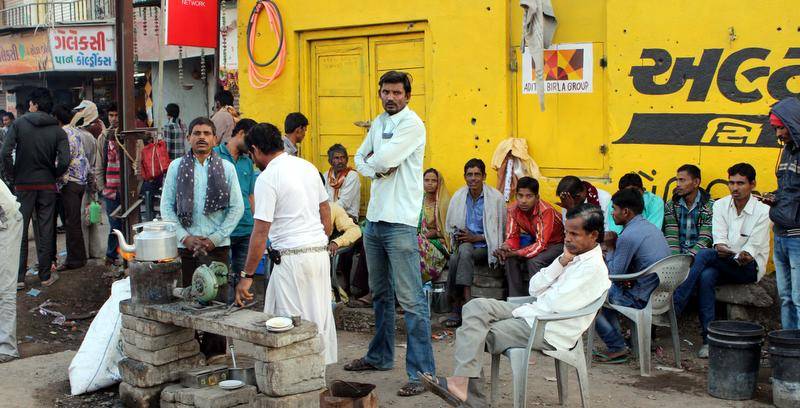
Representative picture of a casual labour market. Photo credit: Times of India
- I have to pay interest on the loan taken at the rate of 5 rupees on Rs. 100 every month. I get change of Rs 1,800 only against a Rs 2,000 note. My landlord threw me out of room as I failed to pay rent, I have now been living on the street since the last 10 days. My wife is unwell, and I have no money to take her to hospital. We even cancelled my sister’s marriage. (Vijay, 55 years old).
- My mom died, she was ill and we did not have money for her treatment, even we eat bread with salt – (Jamilanyaju, 50 years old).
- We slept hungry for ten days. The landlord threw us out of home. Surviving on credit. Now even credit is being denied. (Babulal, 30 years old).
The above are harrowing personal accounts of three casual workers from among tens of thousands who flock to the 50-odd labour markets (chowktis) scattered across the city of Jaipur in Rajasthan every day in search of daily bread for their families.
In the course of a survey of 737 daily wage earners conducted over four days in December by the Rajasthan state unit of PUCL (People’s Union for Civil Liberties), with the help of 64 students studying law in 13 different law colleges, the volunteers recorded numerous such tales of misery and deprivation as a direct consequence of the Modi government’s notebandi.
An overwhelming majority of those interviewed damned demonetisation primarily because of its devastating impact on their work, income and different aspects of lives on one hand and zero gains on the other.
While wages pre-demonetisation were around Rs. 450 per day, post-demonetisation they are down to around Rs. 300 or less, a steep drop of 50% and more each day owing to contraction of the labour market.
Compounding the situation, many reported that the payments were made in old notes whose value had depreciated in the market and thus they could exchange these old notes at a reduced value of up to 25 to 30 percent. Most of the workers reported that an old Rs 500 note fetched Rs 350 to 400 and Rs 1,000 note only about Rs 700. Even payment in new Rs 2,000 note fetched only Rs 1,800 in smaller denomination notes due to paucity of change.
Third, the incomes also eroded because of rise in staple food items like wheat flour. Responses indicated that the price of wheat flour which hovered around Rs 20 a kilogram had shot up to Rs 25 or more a kilo post-demonetisation. Fourth, it is not only the current income which has been knocked off considerably; there is also a strain on future incomes both directly and indirectly.
Due to lack of jobs and incomes, many workers with lower incomes have been forced to take small survival loans from moneylenders at a high rate of five percent per month for bare survival. This high interest is going to make a considerable cut in the future earnings as well.
Almost two-thirds of the workers interviewed reported that they were facing numerous problems related to payment of wages. One problem already stated is related to payment being made in old notes. The payment in old notes and high denomination new notes was a real problem. In several instances only part payment had been made and in others the payment had been deferred. There is uncertainty over whether the arrears will be paid up in future.
About 90 percent of all responses indicate that there has been negative impact on food intake. For about 20 percent the impact has been huge. People reported having slept hungry for days; having starved; surviving on bread and tea and biscuits; eating at akshaypatra; having just one meal a day and so on.
Notebandi has had a negative impact in many respects in the daily life of the casual workers. These include, inability to pay school fees resulting in children not being allowed to sit for examinations, rent to landlord leading to eviction in many cases, postponement of marriages, starvation.
The full report may be accessed here.
Click here for the PUCL’s press release in Hindi.